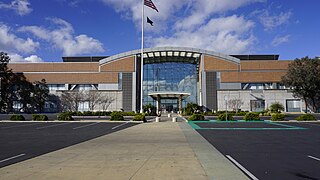Dermatology is the branch of medicine dealing with the skin. It is a speciality with both medical and surgical aspects. A dermatologist is a specialist medical doctor who manages diseases related to skin, hair, nails, and some cosmetic problems.
In the medical profession, a general practitioner (GP) or family physician is a doctor who is a consultant in general practice. GPs have distinct expertise and experience in providing whole person medical care whilst managing the complexity, uncertainty and risk associated with the continuous care they provide. GPs work at the heart of their communities, striving to provide comprehensive and equitable care for everyone, taking into account their health care needs, stage of life and background. GPs work in, connect with and lead multidisciplinary teams that care for people and their families, respecting the context in which they live, aiming to ensure all of their physical and mental health needs are met. They are trained to treat patients to levels of complexity that vary between countries. The term "primary care physician" is more usually used in the US.

Ambulatory care or outpatient care is medical care provided on an outpatient basis, including diagnosis, observation, consultation, treatment, intervention, and rehabilitation services. This care can include advanced medical technology and procedures even when provided outside of hospitals.
Doctor of Medicine is a medical degree, the meaning of which varies between different jurisdictions. In the United States, and some other countries, the M.D. denotes a professional degree. This generally arose because many in 18th-century medical professions trained in Scotland, which used the M.D. degree nomenclature. In England, however, Bachelor of Medicine, Bachelor of Surgery (M.B.B.S.) was used and eventually in the 19th century became the standard in Scotland too. Thus, in the United Kingdom, Ireland and other countries, the M.D. is a research doctorate, honorary doctorate or applied clinical degree restricted to those who already hold a professional degree (Bachelor's/Master's/Doctoral) in medicine. In those countries, the equivalent professional degree to the North American, and some others' usage of M.D. is still typically titled Bachelor of Medicine, Bachelor of Surgery.

Podiatry, or podiatric medicine and surgery, is a branch of medicine devoted to the study, diagnosis, and treatment of disorders of the foot, ankle and lower limb. The healthcare professional is known as a podiatrist. The US podiatric medical school curriculum includes lower extremity anatomy, general human anatomy, physiology, general medicine, physical assessment, biochemistry, neurobiology, pathophysiology, genetics and embryology, microbiology, histology, pharmacology, women's health, physical rehabilitation, sports medicine, research, ethics and jurisprudence, biomechanics, general principles of orthopedic surgery, plastic surgery, and foot and ankle surgery.

A clinic is a health facility that is primarily focused on the care of outpatients. Clinics can be privately operated or publicly managed and funded. They typically cover the primary care needs of populations in local communities, in contrast to larger hospitals which offer more specialized treatments and admit inpatients for overnight stays.

Residency or postgraduate training is a stage of graduate medical education. It refers to a qualified physician, veterinarian, dentist, podiatrist (DPM) or pharmacist (PharmD) who practices medicine, veterinary medicine, dentistry, podiatry, or clinical pharmacy, respectively, usually in a hospital or clinic, under the direct or indirect supervision of a senior medical clinician registered in that specialty such as an attending physician or consultant. In many jurisdictions, successful completion of such training is a requirement in order to obtain an unrestricted license to practice medicine, and in particular a license to practice a chosen specialty. In the meantime, they practice "on" the license of their supervising physician. An individual engaged in such training may be referred to as a resident, registrar or trainee depending on the jurisdiction. Residency training may be followed by fellowship or sub-specialty training. Whereas medical school teaches physicians a broad range of medical knowledge, basic clinical skills, and supervised experience practicing medicine in a variety of fields, medical residency gives in-depth training within a specific branch of medicine.

A feldsher is a health care professional who provides various medical services limited to emergency treatment and ambulance practice. As such, a feldsher is one kind of mid-level medical practitioner.

Family medicine is a medical specialty within primary care that provides continuing and comprehensive health care for the individual and family across all ages, genders, diseases, and parts of the body. The specialist, who is usually a primary care physician, is named a family physician. It is often referred to as general practice and a practitioner as a general practitioner. Historically, their role was once performed by any doctor with qualifications from a medical school and who works in the community. However, since the 1950s, family medicine / general practice has become a specialty in its own right, with specific training requirements tailored to each country. The names of the specialty emphasize its holistic nature and/or its roots in the family. It is based on knowledge of the patient in the context of the family and the community, focusing on disease prevention and health promotion. According to the World Organization of Family Doctors (WONCA), the aim of family medicine is "promoting personal, comprehensive and continuing care for the individual in the context of the family and the community". The issues of values underlying this practice are usually known as primary care ethics.

Swedish Health Services, formerly Swedish Medical Center, is the largest nonprofit health provider in the Seattle metropolitan area. It operates five hospital campuses, ambulatory care centers in the cities of Redmond and Mill Creek, and Swedish Medical Group, a network of more than 100 primary-care and specialty clinics.

Montefiore Medical Center is a premier academic medical center and the primary teaching hospital of the Albert Einstein College of Medicine in the Bronx, New York City. Its main campus, the Henry and Lucy Moses Division, is located in the Norwood section of the northern Bronx. It is named for Moses Montefiore and is one of the 50 largest employers in New York. In 2020, Montefiore was ranked No. 6 New York City metropolitan area hospitals by U.S. News & World Report. Adjacent to the main hospital is the Children's Hospital at Montefiore, which serves infants, children, teens, and young adults aged 0–21.
A medical specialty is a branch of medical practice that is focused on a defined group of patients, diseases, skills, or philosophy. Examples include those branches of medicine that deal exclusively with children (paediatrics), cancer (oncology), laboratory medicine (pathology), or primary care. After completing medical school or other basic training, physicians or surgeons and other clinicians usually further their medical education in a specific specialty of medicine by completing a multiple-year residency to become a specialist.
A medicalintern is a physician in training who has completed medical school and has a medical degree, but does not yet have a license to practice medicine unsupervised. Medical education generally ends with a period of practical training similar to internship, but the way the overall program of academic and practical medical training is structured differs depending upon the country, as does the terminology used.

Baylor Scott & White Medical Center – Temple is a 636-bed multi-specialty teaching hospital located in Temple, Texas. The facility was founded in 1897, when Dr. Arthur C. Scott and Dr. Raleigh R. White Jr. opened the Temple Sanitarium in Temple, Texas. The group practice consists of over 800 physicians and scientists. The primary clinical teaching campus of Texas A&M Health Science Center College of Medicine, Baylor Scott & White – Temple is ranked as one of the top 100 hospitals and one of the top 15 teaching hospitals in the United States by Thomson Reuters. Baylor Scott & White – Temple has 31 accredited residency and fellowship programs, including programs in emergency medicine, radiology and offers a well-established and respected chaplain resident program.
The Kelsey-Seybold Clinic is a large multi-specialty clinic system located in Greater Houston with its administrative headquarters in Shadow Creek Ranch, Pearland. The clinic system is a major provider of healthcare for NASA and a center for healthcare research. In April, 2022, UnitedHealth Group's Optum, Inc. acquired Kelsey-Seybold Clinic.

The National Healthcare Group (NHG) is a group of healthcare institutions located in Singapore. The group was formed in 2000 and operates several hospitals, national specialty centers and polyclinics. Tan Tock Seng Hospital is the largest hospital in the group and serves as the flagship hospital for the cluster.
Medical education in Philippines is principally offered and developed by accredited and government recognized medical schools in the country.

Billings Clinic is a regional health care center based in Billings, Montana. It provides primary and specialty care at Billings Clinic downtown, Billings Clinic Heights, Billings Clinic West, and numerous affiliate locations in Big Timber, Bozeman, Colstrip, Columbus, Glendive, Harlowton, Lewistown, Livingston, Miles City, Red Lodge, Roundup, and Scobey, Montana, as well as Cody, Lovell, and Sheridan, Wyoming. Billings Clinic is the largest healthcare system in Montana & Wyoming.

Seattle Cancer Care Alliance (SCCA) is a cancer treatment and research center in Seattle, Washington. Established in 1998, this nonprofit provides clinical oncology care for patients treated at its three partner organizations: Fred Hutchinson Cancer Research Center, Seattle Children's and UW Medicine. Together, these four institutions form the Fred Hutch/University of Washington Cancer Consortium.
The George Washington University Medical Faculty Associates is a non-profit 501(c)3 physician group practice affiliated with the George Washington University. The MFA group practice is made up of academic clinical faculty of the GW Medical School. As of 2015, the group had more than 750 physicians providing medical services to the Washington DC, Northern Virginia, and Maryland areas. The GW Medical Faculty Associates offers over 51 specialty areas of care. The organization is a partner with the George Washington University Hospital and the School of Medicine and Health Sciences.













